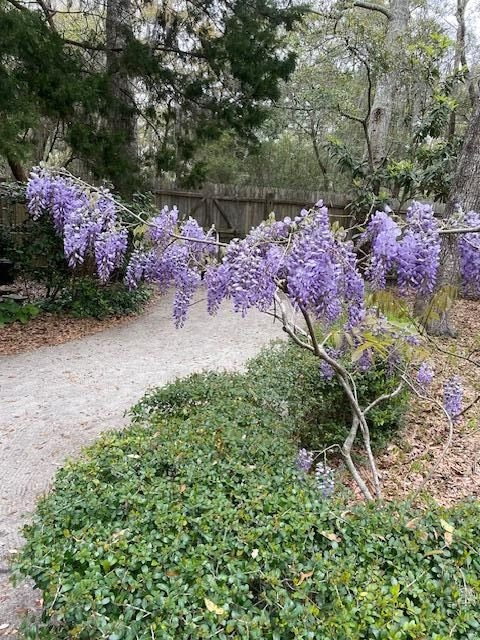
April 26, 2024
Gardening for His Pleasure
Spring at the Center is magical. Right now, the garden at Baba’s house is in full bloom. The assortment of fragrant flowers outside the home that He loved best, inevitably reminds me of Mehera’s garden. The parallels between His home in the West and in the East may be vast or few depending upon the lover’s inclination. But both the gardens that bloom upon His delicate touch and against all odds, have love and His pleasure in common.
Mehera’s garden in Meherazad came to be from Baba’s encouragement to her since He knew how much she loved nature. “Mehera loved making cuttings for the garden, starting seeds, collecting them and so on. Mani and the others would observe Mehera’s enthusiasm when she’d sow the seed of a tree. And they would tease her, knowing that what she really wanted was a full grown tree by the next morning. Such was Mehera’s vision of an abundant garden for her Beloved Baba, and such was the promise held in each and every seed she collected and sowed . . . to become something very beautiful for Baba,” [1] writes Kacy Cook.
Pilgrims who go to Meherazad today see this vision come true in a luscious, tropical garden. As it is with gardens, the product is so enticing to a layman’s eyes that the struggles behind it are unnoticed. And that is by design.
“One day, Baba was admiring the flowers in the garden. Colorful varieties had been planted. Baba loved bright flowers and remarked, “I like these very much. They look so pretty.”
Mehera complained to him, “It’s not easy to grow these kinds of flowers here at Meherazad, where the soil is so poor. We have to bring soil from far away, near the lake. The garden boys harness themselves like bullocks and bring it in a cart. Then, when heavy rains come, the topsoil is washed away, because the ground at Meherazad slopes. It takes so much time to grow these flowers. It’s a lot of work!”
Baba said: “Yes, that is why I appreciate it. Because the soil is poor, you have to work hard, with so much care and love; then the flowers and plants that come up are special. What’s the use if it is good soil, if you plant seeds, water them a little, and they grow easily by themselves? I wouldn’t have appreciated that as much. This is how I like it. I appreciate the garden because of your efforts.”[2]
Mehera added: “So Baba wants that – to work hard and then get results. That is what he appreciates. It isn’t easy. Baba always had a ready answer. From that time, I didn’t complain to Baba that we have poor soil in the compound.”
Here at the Center, guests and locals rush to Baba’s Garden this time of year while the gardeners work untiringly throughout the year. I had never given any thought to the hardships that might present themselves to the gardeners at Meher Abode, but remembering Mehera’s account, I thought to ask. “The soil is sandy and very difficult. Over the years, from the minimal plants that existed during the early days, the soil has been amended and yet it stays very difficult,” says Dori Seeley, the head of the volunteer team of gardeners at Baba’s house.
Dori tells me that mulch is brought from the Center Orchard to help the garden. Some other things that help are bringing soil from off Center, adding minerals and different types of organic fertilizers such as neem powder and Bat Guano. But challenges continue for Dori and her team of five gardeners. “Let me give you an example, the Eutin rose grows in this area and is considered very easy to grow. We did the best we could, but it did not thrive in Baba’s Garden. The same plant is flourishing in my garden at home, just across the street.” How then do they deal with these inexplicable challenges? “We try to focus on harmony and pleasing Baba,” says Dori.
Walking through the woodland garden adorned by flowers worthy only of a king, deity or a Beloved, I am hit with nostalgia and the feeling of being fully present, all at once. Azaleas, the voluptuous bunch of pink pearls, remind me of creeping beauties of bougainvillea all over Meherazad. The dogwoods, to lay eyes like mine, bring forth the memory of clematis outside Baba’s bedroom window in Meherazad. The celebratory arrival of pompoms outside Baba’s room in India is thrilling like the first burst of hydrangeas here. A gentle breeze lulls the flowers as it carries the fragrance of jasmine, a tender and sensory reminder of Baba’s fragrance all over the Center.
I am not a gardener, but gardens always fill me with a sense of hope and faith. In a talk titled “The Significance of Awareness,” Kitty Davy shared a passage very close to her heart from the Epistle to the Hebrews: “Faith is the substance of things hoped for and the evidence of things not seen.” [3]How could it be anything but faith (and love) that would work with barren soil, and through perseverance and patience wait for an unseen reward?
[1] “Gardening with Love,” by Kacy Cook, On Sacred Ground [2] Mehera-Meher, by David Fenster, Vol III p. 297 [3] One Fine Thread, by Kitty Davy, p.213